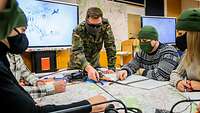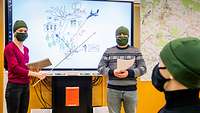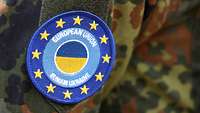Training Legal Advisors for the war in Ukraine
Training Legal Advisors for the war in Ukraine
- Date:
- Place:
- Dresden
- Reading time:
- 5 MIN
In a two-week, binational course, the Bundeswehr provided training to Legal Advisors of the Ukrainian Armed Forces. The participants freshened up their basic knowledge of International Law of Armed Conflict and worked on specific cases.
Maps containing a fictitious exercise scenario, interactive smart boards and flip charts are all over a classroom at a Bundeswehr garrison. Legal texts written in Russian and German are being read thoroughly. Sitting at four tables, legal experts from Ukraine and Germany are discussing questions arising with regard to international humanitarian law, also called International Law of Armed Conflict.
This workshop is part of a two-week pilot course set up for Ukrainian and German Legal Advisors. All signatories to the Additional Protocol I to the Geneva Conventions of 1949 have Legal Advisors as part of their armed forces – for legal rules also do apply in times of war. Every military leader has to weigh military necessities against the compliance with international law during an operation abroad or in an armed conflict. Legal Advisors of the Bundeswehr have an advisory function. They contribute to the HQHeadquarters’s command and control process and, for example, verify the legitimacy of orders.
Dozens of Legal Advisors take part in the course. In October 2022, the EUEuropean Union member states decided to conduct the European Union Military Assistance Mission Ukraine (EUMAM UAEuropean Union Military Assistance Mission Ukraine). This mission aims at providing training support to the Ukrainian Armed Forces in order for them to be able to protect their country and their civilian population effectively. The Multinational Special Training Command (ST-C) coordinates the German element and, thus, for the first time, the training of Ukrainian Legal Advisors.
In this course, military and legal knowledge complement each other. During the first week, personnel of the military legal system of the Bundeswehr grappled intensively with the command and control process of German land forces, military symbols, weapon effects and international humanitarian law. “Our course takes some of the pressure off the Ukrainian army and provides training support”, says Lieutenant Colonel Thomas R., the local military advisor who devised the training course together with legal expert Wolfgang H. The German participants are all legal experts who have passed the first and second state examination in law. Being within their first years of service in the Bundeswehr, they are now learning military principles in order to gain the knowledge necessary to give competent advice on matters of command and control during missions.
Technical vocabulary with regard to the military legal system and military command and control is required
Over the last few days, the participants discussed specific legal matters in working groups and presented the results to their fellow participants to discuss them later on. In a studio adjacent to the classroom of the school, there are two interpreters present for the simultaneous interpreting of presentations, group discussions and even organizational issues in the Russian and German languages. They intensively prepared themselves for their task by learning the technical vocabulary with regard to the military legal system and military command and control. Specifically for this purpose, another Bundeswehr garrison sent simultaneous interpretation equipment.
The Ukrainians benefitted from a training of this kind for the first time. The military personnel, ranging from second lieutenant to colonel, are all studied legal experts or have qualified as Legal Advisors while serving in the Ukrainian Armed Forces. Whereas the Bundeswehr only employs Legal Advisors at division level, the Ukrainian army sometimes even employs Legal Advisors at command posts at battalion level.
“For us, in this course, it is really fascinating to cooperate with Ukrainian Legal Advisors who gained relevant professional experience in an armed conflict. Participating here is a huge benefit for the German Legal Advisors”, says Wolfgang H. The legal expert has provided Legal Advisor training for the Bundeswehr for ten years now and, before that, served himself at the Bundeswehr Joint Forces Operations Command and other garrisons. Together with Lieutenant Colonel Thomas R., he chose the speakers, developed and prepared the case examples and put together the basic material needed for simultaneous interpreting.
Case examples needed for learning under realistic conditions
In four working groups, the participants were allowed to work on specific cases related to international humanitarian law for an entire week. In a case example, one map shows a bridge which is to be demolished in order to cut off the enemy’s supply. “But by demolishing the bridge, we would also lose a corridor for refugees”, counters Max F., a legal expert and Legal Advisor to the Bundeswehr.
The point in time when an originally protected person or specific infrastructure becomes a military target, the way in which prisoners of war get treated, or the question which legal regulations apply to an occupying force, all these are some of the topics intensively discussed by the course participants.
The International Law of Armed Conflict stipulates how military targets may be engaged during an international armed conflict but how, at the same time, the population, buildings and infrastructure, as well as the natural environment can be protected against the effects of hostilities as best as possible.
“As Legal Advisors to the Bundeswehr, it is our responsibility to point out the legal principles. This is about minimizing collateral damage inflicted on civilians, for example protecting hospitals, cultural assets, dams and nuclear power plants. However, it is the local commander who has the final say, who makes a decision, and who bears responsibility”, says Wolfgang H.
Most German course participants meet Legal Advisors who have to live with the sad reality of having to give advice in an armed conflict that is actually happening for the first time. “It is exciting to see how questions arising with regard to International Law of Armed Conflict are dealt with in practice and to be able to enter into dialogue with other legal experts from Ukraine”, says Max F.
At the end of the two-week course, Wolfgang H. expresses his satisfaction: “This training is a model for binational training. The participants assessed the legal case examples with a broad consensus. Our Ukrainian colleagues received an excellent legal education, and there was a fruitful exchange between them and our German colleagues. We had this unique opportunity to enter into dialogue with Legal Advisors who already provided advice in an armed conflict.”







